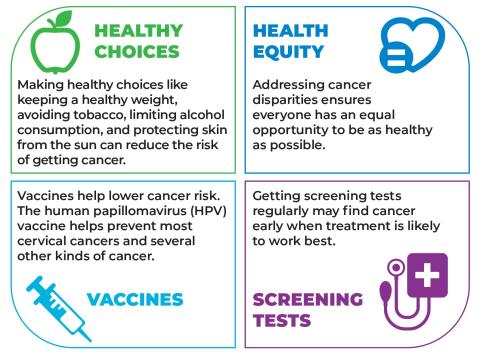
Hunterdon-Mercer Chronic Disease Coalition

Aligned with the State’s Health Improvement Plan, Healthy New Jersey 2030, which aims to improve health for all people, the goal of the Chronic Disease Coalition (“Coalition”) is to address the state’s cancer burden and work toward improving health outcomes for people with or at risk for cancer and other chronic diseases. The Coalition is engaged in the delivery of cancer and chronic disease prevention education, support of early detection initiatives, addressing survivor quality of life along with policy and systems change that contribute to healthy and equitable communities. Coalitions state-wide are supported by the New Jersey Department of Health Office of Cancer Control and Prevention to coordinate comprehensive cancer control efforts in New Jersey and contribute to the national efforts of the Centers for Disease Control (CDC).
- Objective: Promote cancer prevention, support early detection efforts, address the needs of cancer survivors and promote health equity.
- Approach: Deploy evidence-based strategies through a collaborative and coordinated approach to education and outreach initiatives.
- Long Term Outcome: Improved health outcomes for community members.
Download a printable PDF about the Hunterdon-Mercer Chronic Disease Coalition - Reducing the Burden of Cancer in NJ.
What We Do
Deliver evidence-based interventions that can decrease risk factors and increase awareness to achieve improved health outcomes. While not all cancers are preventable, many of the known risk factors can be decreased or eliminated through healthy lifestyle practices, getting appropriate vaccinations and other policy-driven and systematic changes. According to the American Cancer Society, an estimated 42% of cancer cases and 45% of cancer deaths in the US are attributed to potentially modifiable risk factors.
What We Promote
- Healthy Lifestyle Choices
- Cancer Screening
- Early Detection
- Disease Management
- Quality of Life
Prevention education provides residents with the information needed to avoid behaviors that place them at risk of developing cancer, as well as, understanding the warning signs so cancers can be detected early, treated, and controlled or cured.
Cancer is the second leading cause of death in New Jersey. One in 2 men and 1 in 3 women will develop cancer during their lifetimes. The American Cancer Society 2021 data estimates new cancer cases in New Jersey to be 53,340 and estimated deaths to be 15,710.
| Top 5 Cancer Deaths by Gender in New Jersey | |||
| Women | Men | ||
| Cancer Site | # of Deaths | Cancer Site | # of Deaths |
| Lung | 1,651 | Lung | 1,675 |
| Breast | 1,253 | Prostate | 735 |
| Colorectal | 671 | Colorectal | 730 |
| Pancreas | 625 | Pancreas | 677 |
*2019 NJ State Cancer Registry
Nobody is immune from getting cancer and multiple factors both inside and outside the body can contribute to the development of cancer. However, many cancers are preventable by reducing risk factors or getting appropriate vaccinations. Screening is effective in identifying some types of cancers in early, often highly treatable stages. Some risk factors for cancer can be avoided or controlled. For example, people can choose to avoid smoking, modify their diet and increase their exercise. Other risk factors, such as a person’s age, race, family history of cancer, and genetics are not possible to modify.
- Stop smoking. Smoking is linked to several types of cancer — not just lung cancer. Quitting will reduce the risk of cancer in the future.
- Avoid excessive sun exposure. Harmful ultraviolet (UV) rays from the sun can increase the risk of skin cancer. Limit sun exposure by staying in the shade, wearing protective clothing, or applying sunscreen.
- Eat a healthy diet. Choose a diet rich in fruits and vegetables. Select whole grains and lean proteins.
- Exercise most days of the week. Regular exercise is linked to a lower risk of cancer. At least 30 minutes of exercise most days of the week is recommended.
- Maintain a healthy weight. Being overweight or obese may increase the risk of cancer. Work to achieve and maintain a healthy weight through a combination of a healthy diet and regular exercise.
- Schedule cancer screening exams. Talk with a healthcare provider about what types of cancer screening exams are best based on risk factors.
- Ask your provider about immunizations against diseases that increase your risk of cancer. Immunizations can help prevent hepatitis B, which increases the risk of liver cancer, and human papillomavirus (HPV), which increases the risk of cervical and other cancers.

